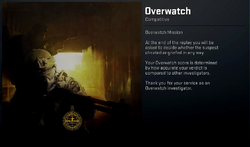Dasiwang: Your Gateway to Trending Insights
Stay updated with the latest news, trends, and insights across various topics.
Behind the Scenes of CSGO's Overwatch System: Unmasking Player Vigilantes
Discover the secrets of CSGO's Overwatch system and how player vigilantes shape the game. Uncover the truth behind this hidden enforcement!
The Mechanics of CSGO's Overwatch System: How Player Reports Shape Gameplay
The CSGO Overwatch System is a crucial feature that plays a significant role in maintaining a fair and competitive gaming environment. This system allows players to report suspicious behavior, such as cheating or toxic conduct, which is then reviewed by a select group of experienced players. When a player submits a report, they may participate in a limited replay review of the accused player's gameplay. This process not only helps in identifying and penalizing offenders but also empowers the community to take part in preserving the integrity of the game.
Once the reports are submitted, the mechanics of the Overwatch System come into play. Reviewers analyze various aspects of the gameplay, including aim hacks, wallhacks, and other forms of cheating. They provide a verdict that ranges from 'Innocent' to 'Guilty,' affecting the player's standing within the community. This collaborative monitoring encourages responsible gaming habits and ensures that players who engage in unfair practices are held accountable. Ultimately, the Overwatch System enhances the overall experience in CSGO, fostering a more enjoyable and equitable atmosphere for all players.

Counter-Strike is a popular first-person shooter game that emphasizes teamwork and strategy. Players can choose from various weapons, and one of the notable sniper rifles is the ssg 08, favored for its accuracy and damage. The gameplay involves either completing objectives or eliminating the opposing team, making it a thrilling experience for gamers around the world.
What Really Happens After a Player is Reported in CSGO?
When a player is reported in CSGO, the process kicks off a series of automated and manual evaluations to determine the validity of the complaint. Initially, all reports are collected and stored in a database, where they can be reviewed by the game's internal systems. The game's algorithms analyze various factors, such as player behavior and game statistics, to assess whether the reported activity qualifies as disruptive or against the community guidelines. If a report is deemed legitimate, this can lead to temporary bans or warnings for the player in question.
After the initial analysis, players can expect that their reports may also contribute to broader patterns of behavior. If a particular player receives multiple reports over time, this can trigger a deeper investigation by the CSGO moderation team. Furthermore, community-cited evidence, including gameplay videos and review feedback, can strengthen a report. Ultimately, the repercussions for the reported player aim not only to sanction but also to promote a fair gameplay environment, encouraging players to engage respectfully while playing.
The Role of Community Vigilantes: Are CSGO Overwatch Investigators Fair?
The community has always played a crucial role in shaping the landscape of online gaming, and in CSGO Overwatch, community vigilantes, or players who volunteer to review reported cases, have emerged as a significant force in maintaining fairness and integrity within the game. These players are tasked with evaluating suspected cheaters and making decisions on whether to ban or exempt them, which places a heavy responsibility on their shoulders. While the intentions of these vigilantes are often commendable, the question arises: are they truly fair in their judgments? The potential for bias and inconsistency can lead to controversial outcomes that affect the very players they aim to protect.
In addition to individual biases, there are systemic issues within the CSGO Overwatch system that can compromise fairness. The decision-making process relies heavily on the community's ability to accurately assess recordings of suspected cheating, which can sometimes be complex and nuanced. Factors such as a lack of experience or differing standards among reviewers can lead to significant discrepancies in verdicts. Consequently, some players may feel unjustly accused or punished based on flawed evaluations. To ensure a more equitable system, improvements to training for reviewers and more comprehensive guidelines are necessary, allowing community vigilantes to perform their duties with greater consistency and fairness.